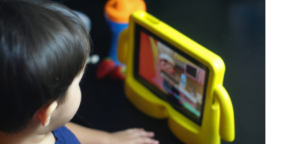Learn about the potential relationship between excessive screen time andToddlers’ Developmental Delays.
Introduction
Screens are an essential component of our life in the digital age. Children are being exposed to screens at an earlier age thanks to anything from cellphones to tablets. However, worries regarding the effects of excessive screen usage on children’s developmental milestones have surfaced Growing worry and interest are being expressed about the possible link between toddlers’ increasing screen use and developmental delays. is thoroughly explored in this article. In order to offer a thorough understanding, we will look at a variety of angles on this subject while fusing professional analysis with firsthand knowledge.

How Much More Screen Time is Associated with Toddlers’ Developmental Delays?

The probable connection between screen time and developmental delays must be addressed. The early years of a toddler’s life are a time of fast brain development, thus too much screen time may have negative effects on that development. Let’s look into some important topics:
Early Brain Development and Screen Exposure
The brain develops most rapidly during the first few years of life. Toddlers gain knowledge throughout this time through practical experiences, social connections, and sensory exploration. Excessive screen time may interfere with these essential functions, thereby delaying the onset of language, motor skills, and cognitive development.
Language and Communication Delays
For toddlers, language development is crucial. Toddlers who spend too much time on screens may miss out on important opportunities to communicate, learn new words, and express themselves. As a result, some kids may struggle to communicate, have language delays, and have trouble with vocabulary and sentence structure.
Social and Emotional Development
By engaging with parents, caregivers, and classmates, toddlers acquire empathy, emotional control, and social cues. The development of critical social skills may be hampered by excessive screen use, which may reduce face-to-face encounters. This could make it more difficult to establish connections, identify emotions, and adjust to social settings.
Cognitive and Attentional Challenges

Rapid transitions, vivid graphics, and short attention spans are frequent features of screen entertainment. Toddlers’ capacity to concentrate and maintain attention on tasks involving more prolonged mental effort may be affected when exposed to such stimuli for longer periods of time. Their general cognitive development and preparation for school may be impacted by this.
Physical Health and Motor Skills

Toddlers need to play actively in order to improve their motor abilities, balance, and physical stamina. Overuse of screens can replace exercise, which might impede the development of gross and fine motor skills. This might show up as issues holding things, sketching, or even just simple hand-eye coordination.
Striking the Right Balance
While the potential effects of screen time are troubling, it’s important to remember that not all screen time is bad. Technology can provide engaging and informative information to promote learning. Discovering the perfect equilibrium holds the key:
Tips for Healthy Screen Time
Prioritize Face-to-Face Interaction:
Ensure that your toddler spends time engaging face-to-face with parents and other adults.
Select Educational Apps and Programs with Age-Related Content:
Select educational apps and programs that correspond to your child’s developmental stage.
Limit your screen time:
Establish precise restrictions on the amount of time spent each day on screens and follow them religiously.
Encourage co-viewing by having a conversation while you watch and learn.
Encourage physical activity to achieve holistic development by promoting outdoor play.
FAQs
Is too much screen time bad for kids?
Not all screen time is bad, though. The kind of content, length, and level of involvement are all very important. When utilized carefully and sparingly, educational and interactive information can have great benefits.
How much screen time is suitable for young children?
For kids between the ages of 2 and 5, the American Academy of Pediatrics advises keeping screen usage to no more than an hour each day. Individual circumstances as well as the type of material should be taken into account.
Can educational applications aid in the development of toddlers?
Yes, correctly selected educational applications can improve early learning and cognitive abilities. Look for applications that promote critical thinking, creativity, and problem-solving.
What toddler developmental deficits are characterized by?
Communication, social interaction, motor skill, and learning challenges are some symptoms. However, as children develop at varying speeds, it’s crucial to avoid making snap judgments.
How can I properly limit my toddler’s screen time?
Establish a daily schedule with a balanced range of activities. Along with moderate, supervised screen use, emphasize reading, outdoor play, and interactive play.
Do kids who spend too much time on screens have any long-term effects?
Language delays, enduring attentional issues, and trouble building deep connections are possible long-term impacts. These impacts, however, might differ and are impacted by a number of variables.
Conclusion
Understanding the possible effects of excessive screen time on children’s developmental delays is crucial in a society where screens are pervasive. Fostering healthy growth requires striking a balance between interactive learning and practical experiences. Caretakers may support their toddlers’ holistic development and ensure a bright and hopeful future by adhering to professional guidance and applying thoughtful screen usage habits.
